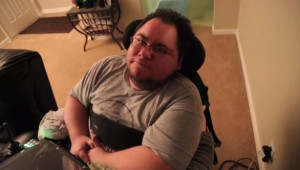Inamorata is a short film about women’s rights and sexuality in the 1960s. It’s being made by director Dominick Evans, who identifies as disabled. This is an important film, and is currently being funded on Indiegogo. You can check out the campaign by clicking here, or at the end of this interview. Since this movie is one I think needs to be made, I wanted to support the project as much as possible. It’s crucial that we include marginalized voices in the media we digest, and Dominick is striving to promote that through his work. I got a chance to speak to him about directing, education, films, and the ableism he has faced in his career.

Hi, Dominick. Can you tell us a little about yourself, and how you got involved in film-making?
I’m 33 years old and was born and raised in Toledo, OH. I actually grew up in a little town outside of Toledo city limits called Walbridge. It was so small I used to cruise around in my wheelchair, and could get from one side of town to the other in about 15 minutes. At 4 I was diagnosed with Spinal Muscular Atrophy Type III. I walked until I was 16, but started using a scooter when I was 11, due to inability to walk long distances. I am the baby of my family. I have two, much older, half brothers, and one full-blooded brother. I’m Polish on my dad’s side and have a rich Polish heritage I have enjoyed discovering as I have gotten older. My maternal side is mostly British and Irish. I was very close to my Irish grandfather, Willie, who died last year, at 94. Other than my dad, who died when I was 20, Willie was my biggest fan. He always encouraged me to follow my dreams no matter what anyone else said about me. I currently live in Dayton, OH with my girlfriend of almost 12 years, Ashtyn, our teenage son, and our adorable shih tzu, Molly. Ash is from Michigan and we lived up there until I decided to return to Ohio to go to film school down in Dayton.
